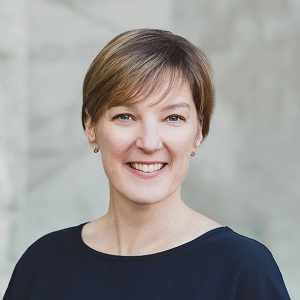
Pronouns
She/Her/Hers
Job Title
Facilitator and Learning Designer
Workplace
BCB Learning Inc.
EDST Degree/s and graduation year/s
MEd, 2005
Concentration
Adult Learning and Education (ALE)
Residence
Sooke, BC, Canada
Beth Cougler Blom is a facilitator and learning designer who, along with her team at BCB Learning Inc., crafts impactful learning experiences for organizations dedicated to making a difference. Her first book, Design to Engage: How to Create and Facilitate a Great Learning Experience For Any Group, was published in 2021. Beth leads the Victoria Facilitators Group community of practice, and contributes to stewarding the Vancouver Island Liberating Structures User Group. She teaches in the Advanced Facilitation Practices professional certificate program at Royal Roads University. Beth also hosts the Facilitating on Purpose podcast, a podcast about designing and facilitating learning. She can be reached via https://bcblearning.com
Website: https://bcblearning.com
LinkedIn: https://www.linkedin.com/in/bethcouglerblom
Beth’s Story
What are some accomplishments or highlights that you are most proud of?
I’ve had the good fortune to work on a wide variety of interesting design and facilitation-related projects but particularly my involvement with the Instructional Skills Workshop and the Facilitating Learning Online (FLO) courses – including being a co-author of an open textbook about how to implement the FLO courses – have been impactful. Writing a book in the field – Design to Engage: How to Create and Facilitate a Great Learning Experience For Any Group – has probably been my biggest accomplishment to date.
What is something that you needed to learn (beyond your degree) or unlearn to be able to work in your sector?
Beyond the time I spent doing my degree I had to educate myself about the practical aspects of learning design and facilitation while on the job and while working with different clients across all sectors. One example of something I had to really go out and teach myself is why learning outcomes are such a foundational part of a learning design process, how to write them and how to design participatory, active sessions that align with outcomes. Learning about adult learning theories is great, but it has to be then followed up by real life practical on the job experience, to see how things work and don’t in real life. Because I balance both work as a learning designer and a facilitator, I don’t rely on just theories to get me through, I can see what works and what doesn’t with real learners – either in person or online.
What does meaningful contribution mean to you?
Meaningful contribution means not only accumulating knowledge for myself as I go throughout my career, and sharing that with my clients, but giving back to the community as much as I can. Because of this, I lead/co-lead two different communities of practice for people who are facilitators/learning designers, and highly value both the learning that I get from being a part of these groups and leading them, and also what I’m able to bring to others…a place to learn, connect, and grow with each other. I’ve always held an abundant mindset about doing this kind of work as an entrepreneur. There are many of us out there in the same position, so why would we view each other as competitors? I’ve always viewed colleagues as collaborators, and this has been a way for us all to meaningfully contribute to each other, and to the field. Similarly, I spend a lot of time on social media sharing tips and strategies around learning design and facilitation, to help the entire field grow and learn.